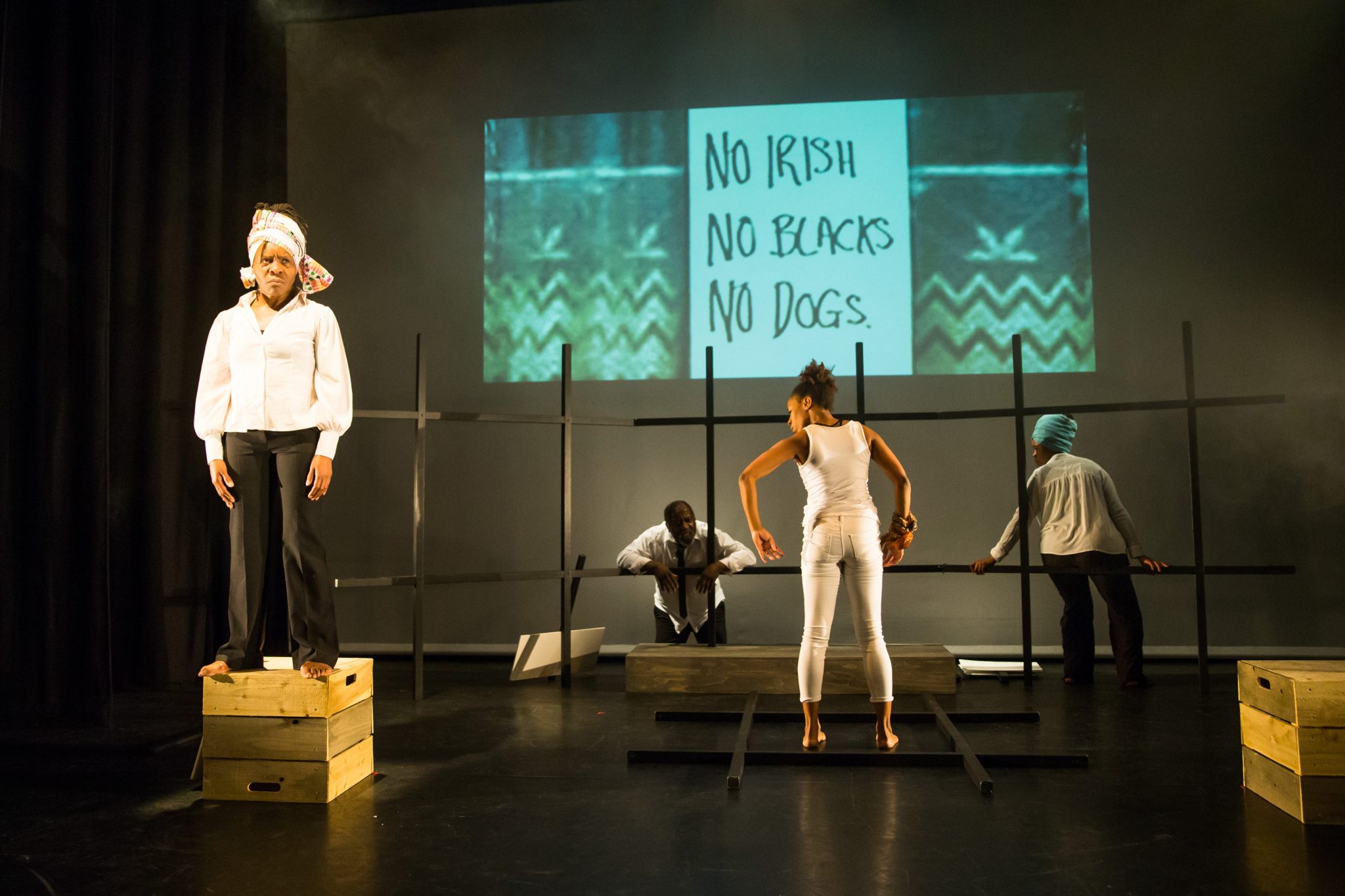#EndingTheSilence is a tripartite production that builds on the previous work performed by Unlock the Chains Collective. The first part of this performance, #BlackLivesMatter premiered in March 2017 in the Pegasus Theatre. Capitalising on its success, the collective have built on it, developing two following parts, called “Walking on Eggshells” and “Rise Up”.
For Unlock the Chains Collective, theatre and performance is a fundamentally holistic and immersive experience that doesn’t begin merely when the curtain rises. Walking into the Old Fire Station a little before the performance, I was greeted by a drumming set performed by Natty Mark-Samuels, Francis Boua, and Batwen Tavaziva, which wonderfully hinted towards the rhythm and the energy yet to come in the second part of the performance. In much the same way, the music played in the intervals was always thematically in-keeping with the antecedent content, and the attention to detail in providing African and Caribbean food during the breaks again made the world constructed by the Collective inescapable for the duration of the performance. In this way, the company blurs the lines between reality and performance, enabling the audience to relate parts of their experiences in some way to the performance. Based only on the ingenuity of the entire theatrical experience, #EndingTheSilence is unmissable – there is nothing quite like it.
The mimicking of idiosyncrasies of race relations is a particular strength of the first part of the performance. To pull apart the ideologies of those indifferent on the subject of race, and of armchair activists, to demonstrate logical inconsistencies of political ideas, and then to follow this with a proposed alternative, a solution, is what one might expect of an essay rather than an energetic and engaging performance. The Collective’s ability to deliver all this with passion and directed energy through a combination of spoken word, dance, and song mixed seamlessly together creates a show that is evidently brimming with talent. Amantha Edmead’s superb dramatic skill fused poignancy with humour – often beginning a presentation of a character with a look at traits which appear comedic before smoothly developing these in such a way that they became the precise traits I ultimately ended up thoughtfully reflecting upon later.
Euton Daley’s writing and direction confronts the audience with a range of black experiences, ranging from the emotionally charged opening spoken word poem depicting a man caught up in the middle of violence stuck holding a gun in a complete sense of terrified inertia, to an empowered and optimistic exploration of what it means to ‘hope’ performed by Griot Chinyere at the close of the show. This is abley accompanied by Bawren Tavaziva’s fluid and often understated yet effective choreography, performed primarily by the incredibly gifted Luke Crook and Nicola Moses with support from the entire cast.
Whilst the energy of the performance was continually appropriate and welcomed by the audience, given some of the themes the Collective dealt with, notably those such as protest and slavery, a fine line was trodden between outraged passion and a slightly pugnacious ‘shock-factor’ attitude which may have detracted from the performance. An extended sequence where a slave is led out of a cage and then beaten was certainly arresting and poignant, yet was not sufficiently and explicitly developed as the show progressed, and thus began to feel retrospectively out of place. In a similar vein, whilst the use of projection onto the back wall of the stage was an incredibly useful device, giving the audience crucial information than enabled us to ground the performance and understand the structure internal to each part, the projection of Klu Klux Klansmen at one point seemed to me unwarranted and one of the very few times the Collective included something to inspire visceral shock rather than deliver a message.
This is not to say that message was lacking – it was pervasive. Ehi Obhiozele’s stand-out spoken word performance on black identity, autonomy, and self-determination in the third part of the show was as arresting as it was genuine. Obhiozele’s naturalism and dextertiy in imitating various modes of speech and attitudes lended his performance the air of a spontaneous discussion with both the audience and the collective, who looked on, interjected at times, and provided a the perfect atmosphere for this performance.
Spontaneity is what Daley’s writing and direction capitalises on. Despite being politically charged and possibly uncomfortable viewing at moments, it wonderfully avoids didacticism. The members of the collective appear to derive their own conclusions throughout the performance, as does the audience. The multiple vignettes into the emotional turmoil of black men provided by Stephen Macaulay are often relatable and always appear instinctive. This spontaneity is enabled in part by Nomi Everall’s inventive set-design, with four large hashtag signs over the course of the performance acting as a cage, a ship, and even a post-modern version of the cross, a symbol of redemption and of the future. The possible configurations of the hashtags, just like the possible conclusions of the Collective, are infinite. Hashtags, and by extension words, may trap us and imprison us, yet they may liberate us and become instrumental in constructing a better future.
During one of the two intervals that took place during this performance, I by chance overheard another audience member discussing how rare it is to see a truly collaborate and collective effort in theatre, with directors of collectives often refusing to engage with the ideas of other members of the group. #EndingTheSilence is a wonderful and welcome exception to this rule: talent is pervasive, but most importantly, individual character shines through. It is precisely this relinquishing of uniformity, and a consequent acceptance of variation and independent identity within the black community that rendered the performance captivating and inspiring, and what fundamentally delivered such an impactful message.



